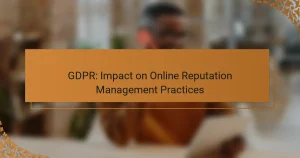Online reputation management is essential for businesses looking to build trust and credibility in the digital landscape. By employing proactive strategies such as customer engagement, content creation, and utilizing reputation management tools, companies can effectively monitor and enhance their online presence. Addressing negative feedback and encouraging positive reviews are key components in maintaining a favorable public perception.
Negative Review Alerts: Setup, Importance and Best Practices
Setting up negative review alerts is vital for businesses aiming to manage their online reputation effectively. These alerts enable timely responses to customer dissatisfaction, allowing companies to address issues swiftly…
GDPR: Impact on Online Reputation Management Practices
The General Data Protection Regulation (GDPR) has transformed online reputation management (ORM) by imposing stringent requirements on data privacy and user consent. Organizations must balance their efforts to maintain a…
Legal Landscape: Online Reviews and Testimonials
The legal landscape surrounding online reviews and testimonials is complex, particularly in the UK, where issues of defamation, consumer protection, and data privacy are paramount. Businesses must navigate these challenges…
Online Reputation Management: Positive Review Responses, Customer Loyalty and Engagement
Online Reputation Management plays a crucial role in building customer loyalty and engagement through positive review responses. By acknowledging and appreciating customer feedback, businesses can foster trust and a sense…
Online Reputation Management: Timely Responses, Customer Retention and Impact
Online reputation management is essential for businesses in the UK, as timely responses to customer inquiries can significantly shape perceptions and enhance brand image. By actively engaging with customers and…
Legal Removal: False Information and Search Results
Removing false information from search results in the UK involves various strategies, such as contacting search engines, seeking legal help, or filing complaints with regulatory bodies. Legal avenues like defamation…
Online Reputation Management: Negative Review Responses, Customer Engagement and Yelp
Online reputation management is essential for businesses, particularly in the age of digital reviews where platforms like Yelp can significantly influence customer perceptions. Responding thoughtfully to negative reviews not only…
Customer Testimonials: Authenticity, Trust and Influence
Customer testimonials serve as powerful tools for building trust and influencing purchasing decisions in the UK market. By showcasing genuine feedback, businesses can provide social proof that reassures potential buyers…
Online Reputation Management for Small Businesses: Budgeting, Tools and Strategies
Online reputation management is crucial for small businesses looking to establish a positive brand image and build customer trust. By actively engaging with customers, monitoring reviews, and utilizing effective tools,…
Online Reputation Management: Tools, Features and Benefits
Online reputation management tools are essential for businesses and individuals looking to monitor and enhance their online presence. By aggregating data from various sources, these tools enable users to track…
How can businesses improve online reputation in the UK?
Businesses in the UK can enhance their online reputation through proactive strategies that focus on customer engagement, content creation, and effective use of technology. By leveraging reputation management tools and actively responding to feedback, companies can build trust and credibility with their audience.
Utilizing reputation management software
Reputation management software helps businesses monitor their online presence and manage their brand image. These tools can track mentions across various platforms, analyze sentiment, and provide insights into customer perceptions. Popular options include Brand24 and ReviewTrackers, which allow businesses to respond quickly to any negative feedback.
When selecting software, consider features like real-time alerts, reporting capabilities, and integration with existing systems. A good tool can streamline your reputation management efforts and save time.
Engaging with customer feedback
Actively engaging with customer feedback is crucial for improving online reputation. Responding to reviews—both positive and negative—demonstrates that a business values its customers' opinions. This engagement can foster loyalty and encourage more customers to share their experiences.
Consider setting up a structured process for responding to feedback. Aim to reply within 24 hours to show responsiveness, and personalize your messages to make customers feel heard.
Implementing SEO strategies
Search Engine Optimization (SEO) plays a vital role in shaping online reputation. By optimizing content for relevant keywords, businesses can improve their visibility in search results, pushing positive content higher and minimizing the impact of negative reviews. Focus on local SEO to attract customers in specific areas.
Key strategies include optimizing website content, using schema markup for reviews, and building backlinks from reputable sites. Regularly updating content can also help maintain a positive online presence.
Creating positive content
Generating positive content is essential for building a strong online reputation. This can include blog posts, customer testimonials, case studies, and engaging social media updates. High-quality content not only enhances brand image but also helps in ranking higher on search engines.
Consider creating a content calendar to consistently publish new material. Highlight customer success stories and share behind-the-scenes insights to create a relatable brand narrative.
Monitoring online presence
Regularly monitoring your online presence is key to managing reputation effectively. Use tools to track mentions of your brand across social media, review sites, and forums. This allows you to stay informed about public perception and address any issues promptly.
Set up Google Alerts or use social listening tools to receive notifications about your brand. Regular audits of your online presence can help identify areas for improvement and ensure that your reputation remains strong.
What are the key tools for online reputation management?
Key tools for online reputation management help individuals and businesses monitor, maintain, and improve their online presence. These tools provide insights into public perception and allow for proactive management of online content.
Google Alerts
Google Alerts is a free tool that notifies users whenever new content matching specified keywords appears online. By setting up alerts for your name, brand, or specific topics, you can stay informed about mentions across the web.
To use Google Alerts effectively, choose relevant keywords and set the frequency of alerts to daily or weekly. This allows you to respond quickly to both positive and negative mentions, helping to manage your online reputation proactively.
BrandYourself
BrandYourself is a reputation management platform designed to help users improve their online presence. It offers tools for optimizing search results and removing negative content, making it easier for individuals to control their digital footprint.
Users can create a personal profile on BrandYourself, which can rank higher in search results, pushing down less favorable content. The platform also provides guidance on best practices for maintaining a positive online image.
Reputation.com
Reputation.com focuses on managing and improving business reputations online. It provides comprehensive services, including monitoring reviews, social media mentions, and overall sentiment analysis.
This platform is particularly useful for businesses looking to enhance customer engagement and respond to feedback effectively. By leveraging its analytics, companies can identify trends and areas for improvement, ensuring a positive public image.
Hootsuite
Hootsuite is a social media management tool that allows users to schedule posts, monitor mentions, and analyze engagement across various platforms. It helps manage online reputation by enabling timely responses to customer inquiries and feedback.
With Hootsuite, you can track brand mentions and industry trends in real-time, making it easier to engage with your audience. This proactive approach can significantly enhance your online reputation and foster customer loyalty.
What strategies can mitigate negative reviews?
To mitigate negative reviews, businesses can implement several effective strategies that focus on engagement and resolution. These strategies include responding promptly to criticism, encouraging positive reviews, and offering resolutions to unhappy customers.
Responding promptly to criticism
Timely responses to negative reviews can significantly influence public perception. Aim to reply within 24-48 hours to show that you value customer feedback and are committed to improvement.
When addressing criticism, maintain a professional tone and acknowledge the customer's concerns. This approach not only helps to de-escalate the situation but also demonstrates to potential customers that you are attentive and proactive.
Encouraging positive reviews
Encouraging satisfied customers to leave positive reviews can help balance out negative feedback. Consider asking for reviews after a successful transaction or service experience, as customers are more likely to share their thoughts when they feel pleased.
Utilize follow-up emails or in-store prompts to remind customers to leave feedback. Offering incentives, such as discounts on future purchases, can also motivate customers to share their positive experiences online.
Offering resolution to unhappy customers
Providing a resolution to unhappy customers can turn a negative experience into a positive one. Reach out to customers who leave negative reviews and offer solutions, such as refunds, replacements, or discounts.
By addressing their issues directly, you not only improve their satisfaction but also demonstrate to others that you are willing to take responsibility and make things right. This can enhance your overall reputation and encourage trust among potential customers.
What metrics should be tracked for reputation management?
To effectively manage online reputation, focus on metrics that reflect public perception and engagement. Key areas include sentiment analysis scores, review ratings, and social media engagement, each providing insights into how your brand is viewed and interacted with.
Sentiment analysis scores
Sentiment analysis scores gauge public opinion by analyzing text data from various sources, such as reviews and social media posts. These scores typically range from negative to positive, helping you understand overall sentiment towards your brand.
To track sentiment, utilize tools that aggregate data from multiple platforms. Aim for a consistent monitoring schedule to identify trends and respond promptly to shifts in public perception.
Review ratings
Review ratings are numerical scores given by customers based on their experiences with your products or services. These ratings often influence potential customers' decisions and can significantly impact your brand's reputation.
Regularly monitor review platforms relevant to your industry, such as Google Reviews or Yelp. Aim for an average rating above 4 out of 5, and actively encourage satisfied customers to leave positive feedback while addressing negative reviews constructively.
Social media engagement
Social media engagement measures how audiences interact with your brand on platforms like Facebook, Twitter, and Instagram. Metrics include likes, shares, comments, and overall follower growth, which reflect your brand's reach and resonance with the audience.
To enhance engagement, post regularly and respond to comments promptly. Aim for a balanced content strategy that includes promotional posts, informative content, and interactive elements like polls or questions to foster community involvement.
What are the legal considerations in online reputation management?
Legal considerations in online reputation management include understanding defamation laws, privacy rights, and the implications of false information. Companies and individuals must navigate these laws carefully to avoid legal repercussions while managing their online presence.
Understanding defamation laws
Defamation laws protect individuals and organizations from false statements that could harm their reputation. In general, defamation can be categorized into two types: libel (written statements) and slander (spoken statements). To prove defamation, the affected party usually must show that the statement was false, damaging, and made with negligence or malice.
In the United States, the burden of proof is on the plaintiff, while in many European countries, the burden may shift to the defendant. This difference can significantly impact how online reputation management strategies are developed, especially when addressing negative reviews or comments.
When managing online reputation, it is crucial to avoid making false claims about competitors or individuals, as this could lead to legal action. Regularly monitoring online content and responding to inaccuracies promptly can help mitigate potential defamation issues.






